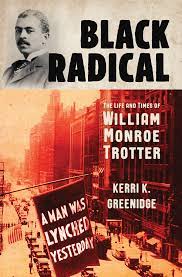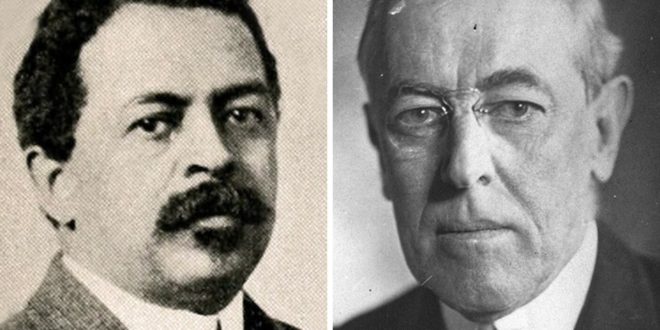Podcast: Play in new window | Download (Duration: 59:01 — 81.0MB)
 Because I want to use this introduction to correct a gap in the show today – entirely of my doing – I’ll have to rush a bit to tell you what you will hear about. Here we go:
Because I want to use this introduction to correct a gap in the show today – entirely of my doing – I’ll have to rush a bit to tell you what you will hear about. Here we go:
- Booker T. Washington and Racial Conservatism
- Washington’s Tuskegee Institute and his “machine politics”
- W. E. B. Du Bois and the Niagara Movement
- The 1908 white riot in Springfield, Illinois
- The NAACP as the creation of white liberal philanthropists
- Woodrow Wilson, supported by the Black community
- D. W. Griffith’s anti-black propaganda film Birth of a Nation
- Woodrow Wilson hated by the Black community
- Militant radicals Marcus Garvey and Hubert Harrison
- Cyril Briggs and the African Blood Brotherhood
- The Tulsa Race Massacre of 1921
At or near the center of all of these stands William Monroe Trotter, the most important Black radical journalist and agitator you’ve never heard of – co-owner and editor of The Boston Guardian from 1901 until his death in 1934. He was 62 years old.
What you won’t hear about in what follows is the Crumpacker Resolution, but the strategy of this recurs in the book many times over about a one hundred page span, and at its heart is the 14th Amendment to the US Constitution.
Here’s a shortened version of the 14th amendment’s second section:
Representatives shall be apportioned among the several States according to their respective numbers…. But when the right to vote at any election… is denied to any of the male inhabitants of such State, or in any way abridged, except for participation in rebellion, or other crime, the basis of representation therein shall be reduced in…proportion…
Recall from our show on Thaddeus Stevens, the radical Republican who pushed Lincoln to the left politically, that the 13th, 14th, and 15th amendments are called the “Reconstruction amendments” as they abolished slavery and guaranteed equal protection of the laws and the right to vote in the wake of the US Civil War. Ensuring that these amendments were in force was a major part of Monroe Trotter’s purpose in life. Adopted in 1868, the 14th amendment is still being flouted by white politicians today, as state legislatures introduce legislation that restrict the opportunity to vote and disproportionately affect Black citizens.
The Crumpacker Resolution, named for a U.S. Representative from Indiana, was introduced on January 3, 1901, in response to wide-spread white violence against black voters across the South in clear and constant violation of the 14th amendment. The most glaring and terrible example is the 1898 coup in Wilmington, North Carolina, where a group of the state’s white Southern Democrats and hundreds of white businessmen, all heavily armed, stoked mob violence in order to overturn the legitimately elected local Fusionist biracial government. Black-owned property and businesses were destroyed and as many as three hundred people were killed and an estimated two thousand residents were displaced.
It’s perhaps little in the way of justice, but the Crumpacker Resolution would diminish the representative power of states perpetrating these acts. Monroe Trotter’s Guardian promoted the resolution and sponsored a rally in support of it.The resolution was defeated handily in January and then again in June, 1901, though this was a government firmly in the hands of the so-called “party of Lincoln”.
 Guest
Guest
Kerri K. Greenidge, author of Black Radical: The Life and Times of William Monroe Trotter published by Liveright, an assistant professor in the Department of Studies in Race, Colonialism, and Diaspora at Tufts University.
RELATED
On the Fight for Black Voting Rights at the Turn of the 20th-Century by Kerri K. Greenidge
How William Monroe Trotter Mobilized Black Americans Across Class Lines by Kerri K. Greenidge
The “Reconstruction Amendments” (13th, 14th, and 15th)
The Legacy of a Radical Black Newspaperman (The New Yorker)
Speaking the Language of White America: Violence and the End of Slavery (Interchange with Kellie Carter Jackson)
Pushing Lincoln Left: Thaddeus Stevens as Revolutionary (Interchange with Bruce Levine)
The Tragic Birth of Black Populism (Interchange)
MUSIC
“Mr. Freedom X” Miles Davis (On the Corner)
“The Free Slave” Roy Brooks (The Free Slave)
“Members, Don’t Git Weary” Max Roach (Members, Don’t Git Weary)
“Blacknuss” Roland Kirk (Blacknuss)
“Freedom Death Dance” Eugene McDaniels (Headless Heroes of the Apocalypse)
ID bed – “The Long March” Max Roach & Archie Shepp (The Long March)
CREDITS
Producer & Host: Doug Storm
Executive Producer: Kade Young
 WFHB Bloomington Community Radio
WFHB Bloomington Community Radio


